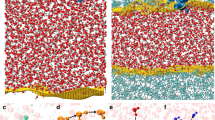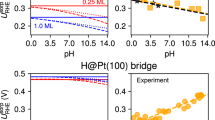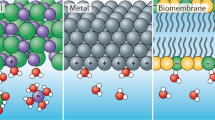Abstract
Ehrensvärd and Sillén1 have recently considered the interfacial potential difference between two immiscible or slightly miscible liquid phases containing electrolytes ; they conclude that the E.M.F.'s across cells of the type are not derived from true partition equilibria of the electrolyte between the aqueous phases and the adjoining regions of the oil phase, but from an "ion adsorption equilibrium between the aqueous phases and the interfacial layer".
This is a preview of subscription content, access via your institution
Access options
Subscribe to this journal
Receive 51 print issues and online access
$199.00 per year
only $3.90 per issue
Buy this article
- Purchase on Springer Link
- Instant access to full article PDF
Prices may be subject to local taxes which are calculated during checkout
Similar content being viewed by others
References
Ehrensvärd, G., and Sillén, L. G., NATURE, 141, 788 (1938).
Stern, O., Z. Elektrochem., 30, 508 (1924).
Levine, S., personal communication.
Philpot, J. St. L., Phil. Mag., 13, 775 (1932); Craxford, S. R., Dissertation, Oxford, 1936.
Author information
Authors and Affiliations
Rights and permissions
About this article
Cite this article
CRAXFORD, S., GATTY, O. & ROTHSCHILD Adsorption Potentials. Nature 141, 1098–1099 (1938). https://doi.org/10.1038/1411098a0
Published:
Issue Date:
DOI: https://doi.org/10.1038/1411098a0
This article is cited by
-
An electrochemical viewpoint on the solubility of silver halides in water
Journal of Solid State Electrochemistry (2020)
-
The interaction of anionic detergents with lipid bilayer membranes
Biophysik (1973)
-
Adsorption Potentials and Ageing Liquids
Nature (1938)
Comments
By submitting a comment you agree to abide by our Terms and Community Guidelines. If you find something abusive or that does not comply with our terms or guidelines please flag it as inappropriate.



